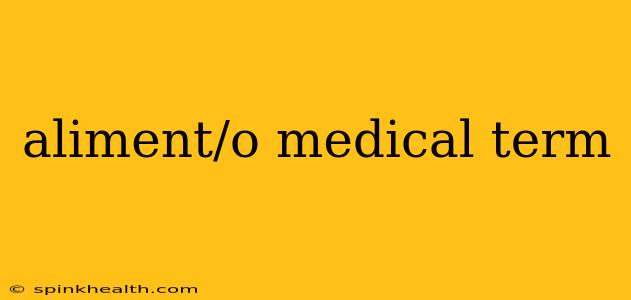The seemingly simple medical term "aliment/o" holds a surprising amount of depth, unlocking a fascinating world within our bodies—the digestive system. It's not just a random collection of letters; it's a key that opens the door to understanding nutrition, digestion, and various related health conditions. Let's embark on a journey to unravel its meaning and explore its significance in the medical field.
My name is Dr. Evelyn Reed, and I've dedicated my career to gastroenterology. Understanding terminology like "aliment/o" is fundamental to comprehending the intricate processes that keep us alive and well.
What Does Aliment/o Mean?
At its core, "aliment/o" is a combining form in medical terminology. It derives from the Latin word "alimentum," meaning "nourishment" or "food." Therefore, "aliment/o" directly relates to nutrition and the processes involved in taking in, digesting, and absorbing food. It's a root word that appears in many medical terms associated with the digestive tract and its functions.
Common Medical Terms Using "aliment/o"
The versatility of "aliment/o" is evident in the wide array of medical terms it contributes to. Some examples include:
- Alimentary canal: This refers to the entire pathway food travels through, from the mouth to the anus. It encompasses the esophagus, stomach, small intestine, and large intestine.
- Alimentary paste: This refers to a prepared food substance, often with medicinal properties.
- Alimentary tract: Essentially synonymous with the alimentary canal, it highlights the pathway's role in processing nourishment.
Understanding the base meaning of "aliment/o" helps decipher the meaning of these more complex terms.
What Are the Functions of the Alimentary Canal?
The alimentary canal is far more than just a tube; it's a sophisticated system with multiple vital functions:
- Ingestion: The process of taking food into the body through the mouth.
- Digestion: The breakdown of food into smaller molecules that can be absorbed into the bloodstream. This involves mechanical processes (chewing, churning) and chemical processes (enzymes breaking down complex molecules).
- Absorption: The movement of nutrients from the digestive tract into the bloodstream. This occurs primarily in the small intestine.
- Elimination: The removal of undigested food and waste products from the body through defecation.
What are some common disorders of the alimentary canal?
Numerous disorders can affect the alimentary canal, impacting digestion, absorption, and overall health. These include, but are not limited to:
- Gastroesophageal reflux disease (GERD): A condition where stomach acid flows back into the esophagus.
- Peptic ulcers: Sores that develop in the lining of the stomach or duodenum (the first part of the small intestine).
- Inflammatory bowel disease (IBD): A group of chronic conditions that cause inflammation in the digestive tract, including Crohn's disease and ulcerative colitis.
- Constipation: Infrequent or difficult bowel movements.
- Diarrhea: Frequent, loose, or watery stools.
How is the alimentary canal related to overall health?
The health of the alimentary canal is intrinsically linked to overall well-being. Proper digestion and nutrient absorption are crucial for energy levels, immune function, and maintaining overall health. Problems with the alimentary canal can lead to nutrient deficiencies, weight loss, fatigue, and other significant health issues.
What are some tests used to diagnose alimentary canal problems?
Diagnosing alimentary canal problems often requires a combination of approaches:
- Physical examination: Assessing symptoms and physical signs related to the digestive system.
- Endoscopy: A procedure that uses a thin, flexible tube with a camera to visualize the inside of the digestive tract.
- Imaging tests: X-rays, CT scans, and MRIs can provide detailed images of the digestive organs.
- Blood tests: Assessing blood levels of certain substances, like inflammatory markers or nutrient levels.
- Stool tests: Checking for the presence of blood, parasites, or other abnormalities.
In conclusion, "aliment/o" is more than just a medical term; it represents the crucial role of nutrition and the digestive system in maintaining health. Understanding this fundamental combining form allows for a deeper appreciation of the complex processes involved in nourishment and the implications of digestive disorders. If you have any concerns about your digestive health, consult a healthcare professional for proper diagnosis and treatment.

